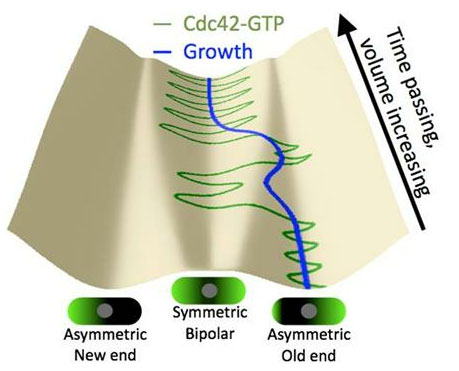| May 18, 2012 |
A cell's first steps: Building a model to explain how cells grow
|
|
(Nanowerk News) A collaboration between Lehigh University physicists and University of Miami biologists addresses an important fundamental question in basic cell biology: How do living cells figure out when and where to grow?
|
|
The study, Oscillatory Dynamics of Cdc42 GTPase In The Control of Polarized Growth, appears today in the journal Science Express ("Oscillatory Dynamics of Cdc42 GTPase in the Control of Polarized Growth").
|
 |
| An illustration of the Lehigh mathematical model shows the evolution of Cdc42 distribution during cell growth, as cells transition toward a symmetric, or growth state.
|
|
Assistant Professor Dimitrios Vavylonis and graduate student Tyler Drake joined University of Miami researchers to learn that protein Cdc42 begins the ballet of proteins that change cell polarity, by oscillating throughout the cellular membrane of new cells. By changing polarity, Cdc42 regulates shape, structure and function in yeast cells. This oscillatory mechanism may be a general strategy among all self-organizing biological systems, not just simple yeast.
|
|
Researchers used fluorescent markers to tag each of the many proteins involved, observing the protein oscillate, switching sides about every five minutes. The fluctuations provide an adaptable mechanism for cells to control their size and structure in the fast-changing environment within.
|
|
The findings demonstrate just part of the complex process of cell growth and differentiation, but mark how advanced the science of biophysics has become. Only recently has the clear imaging and monitoring of protein activity become possible at the minute sizes and shortened time scales of individual cell maturation.
|
|
Vavylonis's research has for years explored the way the cellular cytoskeleton organizes and functions. In collaboration with biologists and computer scientists, his team uses physics to study, analyze, and model the physical properties of these adaptive biological materials.
|
|
The study was funded by the National Science Foundation, the National Institutes of Health, and by individual university groups including a Lehigh Class of 1968 Junior Faculty Fellowship and a Sigma Xi grant to Drake.
|

